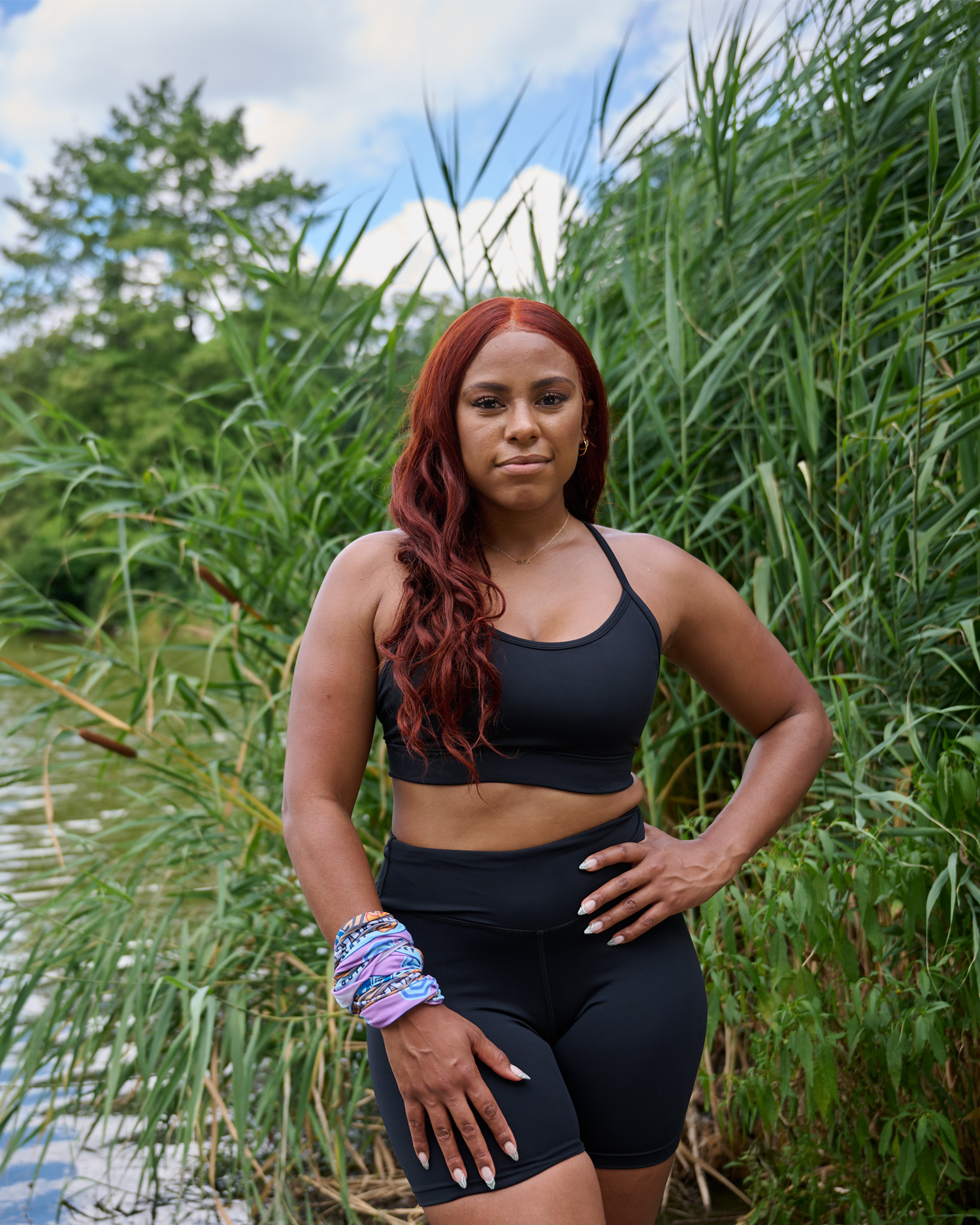
Survivor: Manhattan
Superfan Margot Leitman spends a day in the urban jungle with recent "Survivor" contestant Chanelle Howell.
By Margot Leitman
A
s torrents of rain pour down over the thin outdoor shack covering us at an uptown smoothie bar, my notebook is drenched, my phone is getting wet, and so are we. "It's A-OK," says Chanelle Howell '14 (CLAS). "I've seen much worse."
Of course she has. She was on season 42 of "Survivor."
As torrents of rain pour down over the thin outdoor shack covering us at an uptown smoothie bar, my notebook is drenched, my phone is getting wet, and so are we. "It's A-OK," says Chanelle Howell '14 (CLAS). "I've seen much worse."
Of course she has. She was on season 42 of "Survivor."
First airing in 2000, "Survivor" is the granddaddy of reality shows. Originally intended to be a challenge of survival in the wild, the game has evolved into "100% a social experiment, unequivocally," says Howell. But there are still plenty of physical challenges.
I should know. I, too, have been immersed in "Survivor" of late. From my couch.
I recently discovered the show and have been consuming as much as I can to make up for 22 years of lost time. I flew across the country for this opportunity to talk with Howell and I am wondering about so many things. But first and foremost, I wonder why our smoothies are taking so long. Howell is unfazed. One of her big gains from "Survivor," she says, is understanding the principle of patience. Back in New York now, she's decked out in stylish running gear, with long hair, manicured nails, and her purple "Survivor" buff wrapped around her wrist, because she thought I would appreciate it. I did. Howell is even more beautiful in person than she was on my TV screen.
I work through my hunger-stoked lightheadedness and pull my frizzed-out hair away from my face to get started on our interview, smoothie or no smoothie. I am curious if she views the show differently, as a fan who has now seen the sausage getting made. Howell says she still loves "Survivor," she just sees it through a new lens.
"I view it now as more of a production versus a natural organic experience — which is completely fine, because it's not. We are not in a plane crash that goes down in the middle of the ocean and forces us to survive. I will never forget when I first started the show and we pulled up in the boat onto the beach and there is a sea of hundreds of cameras and I was like, 'OK, this is massive.'"
Our smoothies arrive and with them the blazing sun comes back, causing black eye makeup to sweat down my face. Howell's makeup and hair stay put. She's made for TV, and I have a feeling she will be a part of many more "massive" experiences. She doesn't complain at all in these extreme city temperatures (95 degrees in the shade) and never once glances down at her phone. She seems to be truly in the moment, something people spend a lifetime searching for. And that will last longer than any prize money — which she humbly reminds me many times she did not win.
Howell was the seventh person voted out of season 42 and the first juror so, yes, she lost the game. As a jury member, though, she stayed on the island and on the show after being voted out, in order to monitor tribal councils and then help choose the winner.
A year later, she seems settled back into her New York City routine. And while the island of Manhattan may not be quite as cutthroat as the show's Mamanuca Island, both are challenging in their own ways. In fact, a lot of what we talked about over our highly anticipated smoothies (seriously, what took so long?) was similar to a "Survivor" episode — with plenty of challenges, occasional rewards, scarce advantages — and many, many blindsides.
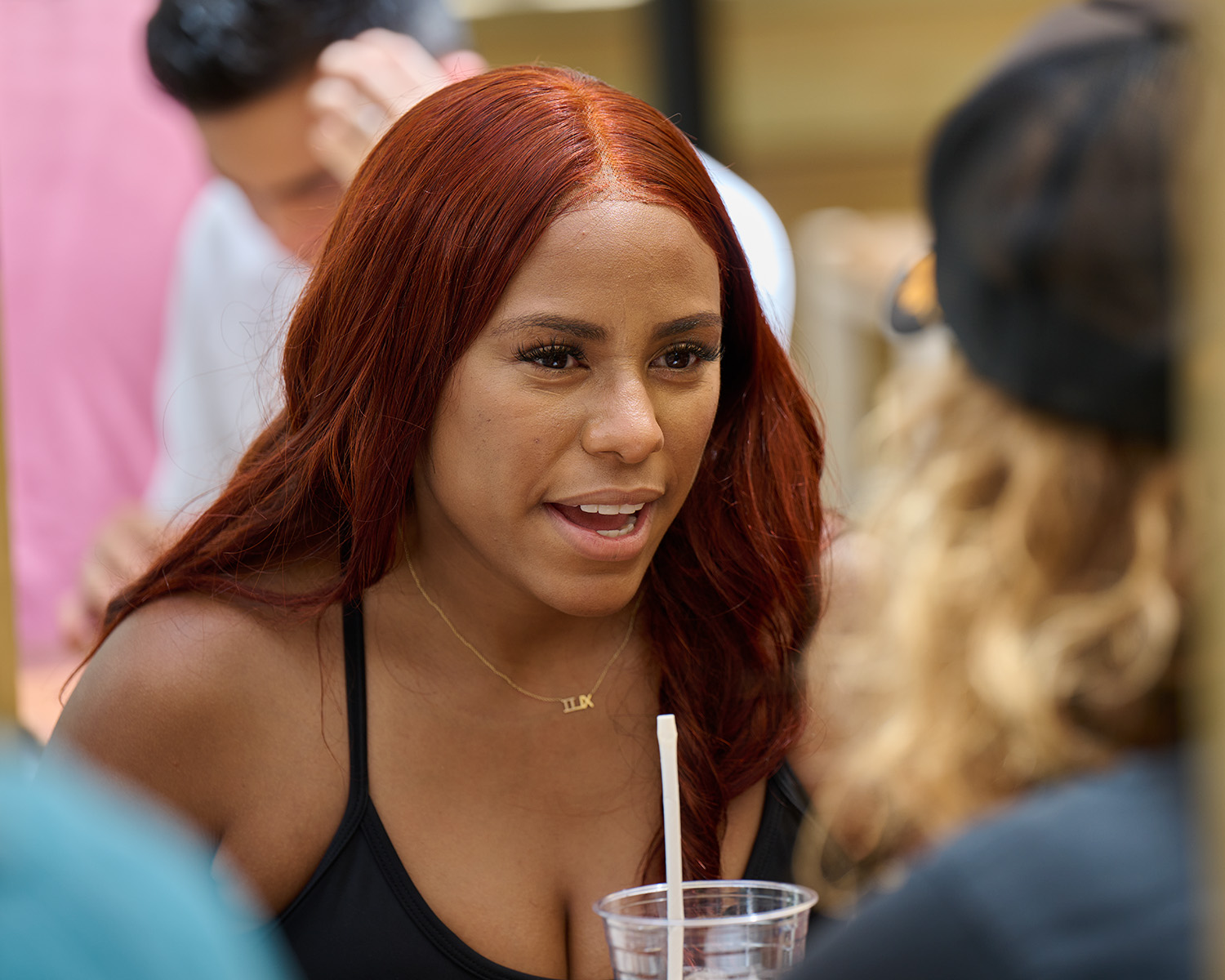
"I used to be someone who played very small "¦ now I'm going to take up space."
Challenge:
A pandemic hits and Howell gets furloughed from her job at a consulting firm.
Reward:
She has extra time on her hands to make a killer "Survivor" audition tape.
Blindside:
She makes the show right after landing a fantastic new job at one of the top investment banks in the world.
➤ Getting cast was a big deal for Howell, who hails from Hamden, Connecticut, just north of New Haven. "This doesn't happen to people like me, people from my neighborhood, people from my community, it just doesn't." Trouble was she got the call right after getting hired at her new job, and doing the show would mean immediately asking "for two months off to run around in the jungle barefoot." Luckily, her new boss is a "Survivor" fan and kindly allowed Howell to do just that. That serendipity put her in a mindset that she must be destined to win.
Challenge:
Howell needs to prepare for living in the jungle while residing in Manhattan.
Reward:
Central Park turns out to be a good spot for running hills and practicing fire-starting skills.
Blindside:
Once on the show, she realizes you can train all you want for the physical strength and survival skills, but what really matters is your mental game.
➤ Howell trained hard for all aspects of "Survivor." After hours of demanding physical workouts, she says, "I would practice making fire in Central Park, I would go find a rock and get my little flint." She made sure the fires were small: "I'm not trying to get arrested before going on 'Survivor.'"
And while Howell, a communications major and human rights minor, read books like "Can't Hurt Me: Master Your Mind and Defy the Odds" by former Army Ranger/Navy SEAL David Goggins to ready herself, she found she was unprepared for how much she would evolve mentally.
"Significant parts of my personality have changed coming out of the show. Confidence. I used to be someone who played very small whenever I walked into a space ... versus now I'm going to show up as I am, I'm going to take up space, I'm going to be my full self."
It's the moments like this I want to shout, "I'm telling you, you did not lose!" I mean, here is a woman who can now make fire from flint, made lifelong friends, kept her dream job, got a free trip to Fiji, and gained mega confidence.
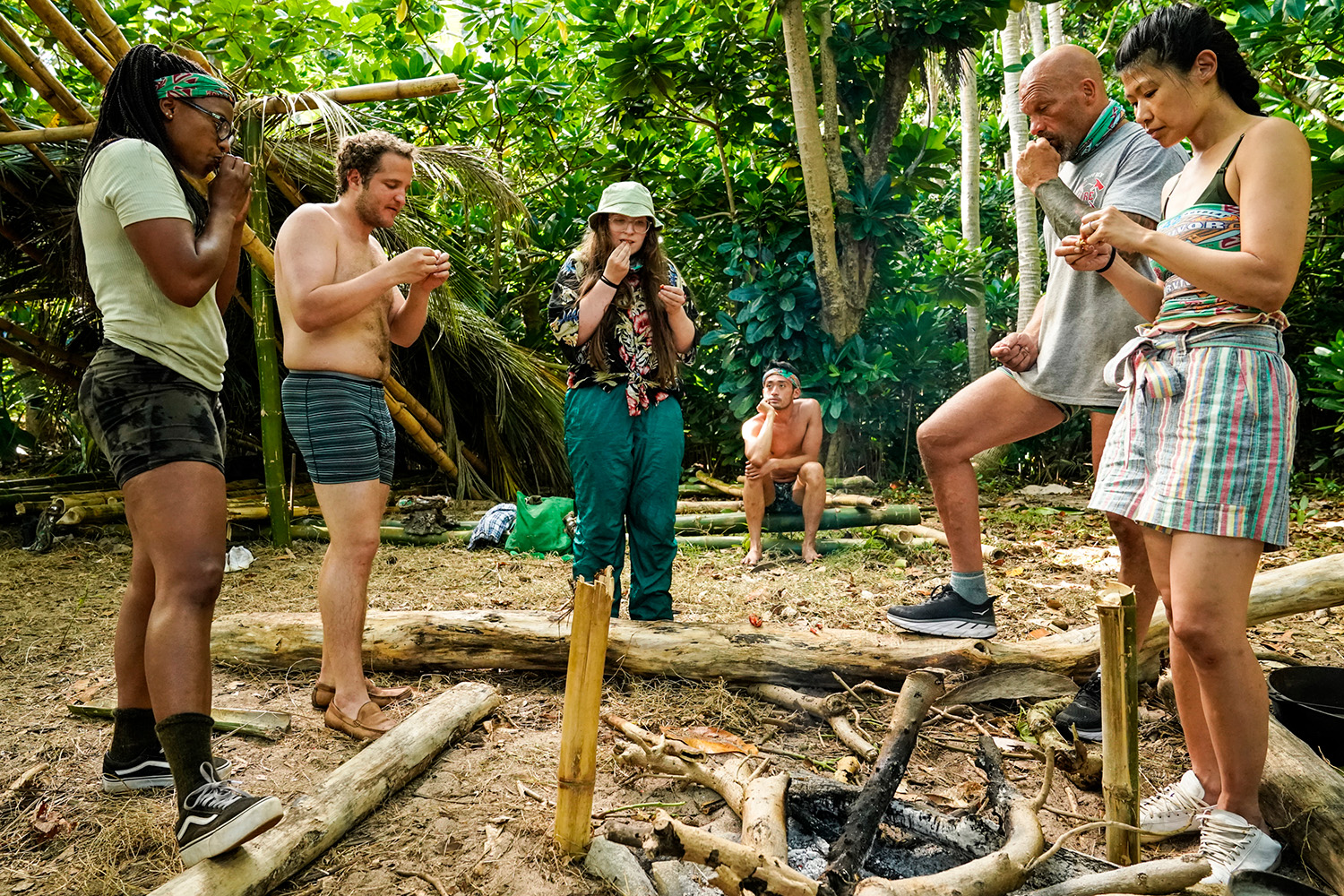
Howell's "tribe" did not eat until Day 5, when she and Hai Giang (seated) managed to catch a few minnows and coconut crabs.
Challenge:
Get noticed in a group of people who are all trying to get noticed.
Advantage:
Howell learned to stand out from the crowd after transferring from Eastern to UConn.
Blindside:
It turns out everyone on "Survivor" is an uber-extrovert.
➤ "I think that I'm a pretty personable person, but once they put you in a room with other extroverts, you're like, 'Damn.'"
Very early in her season Howell discovered some contestants had almost magical social skills. So she channeled some magical Husky thinking. After transferring to UConn from a smaller university, she says she learned the importance of significance, of wanting to be a part of something bigger than herself. "It showed me you can do more."
Talking to me for UConn Magazine is exciting and feels "full circle," she says.
"When I was back at UConn would I in a thousand years have thought I would be where I am right now? No! Not nearly!"
Challenge:
This season "Survivor" made everyone work for food and supplies, no freebies on rice or gear.
Advantage:
Howell had experience roughing it and had even killed a chicken when volunteering in Africa.
Blindside:
Unlike in previous seasons, there were no chickens to kill in season 42.
➤ During her time at UConn, Howell volunteered to work at an orphanage in Cameroon, Africa, with a group called UConn Empower. "It was one of those formative experiences that I put on the same level as 'Survivor.' It significantly shifts integral pieces of your personality and how you view the world."
Little did she know how good a "Survivor" proving ground it would be. In Cameroon she subsisted on mostly rice and tomato paste and walked to a river for fresh water. When she and her fellow volunteers wanted to celebrate their last day with a special chicken dinner for the children, she found — blindside — she had to kill it herself. "You can't go and buy chicken breast in the store there, you bought the live chickens."
On "Survivor," she barely ate for 12 days.
"We won fishing equipment on day 5 "¦ we were like, 'OK, who wants to take out the fishing equipment?' And everyone was looking around, no one wanted to do it. So I was like, 'I will do it.'"
She and tribemate Hai Giang, with whom she is still very close, caught some minnows and coconut crabs and boiled them all together. That was the only time her tribe ever caught fish. They then survived on a few coconuts until earning rice on day 12. "The hungriest I was was day one ... but after a certain amount of time you're like, it's not coming, it's never coming, you just get used to it." That's why she was so chill about those smoothies.
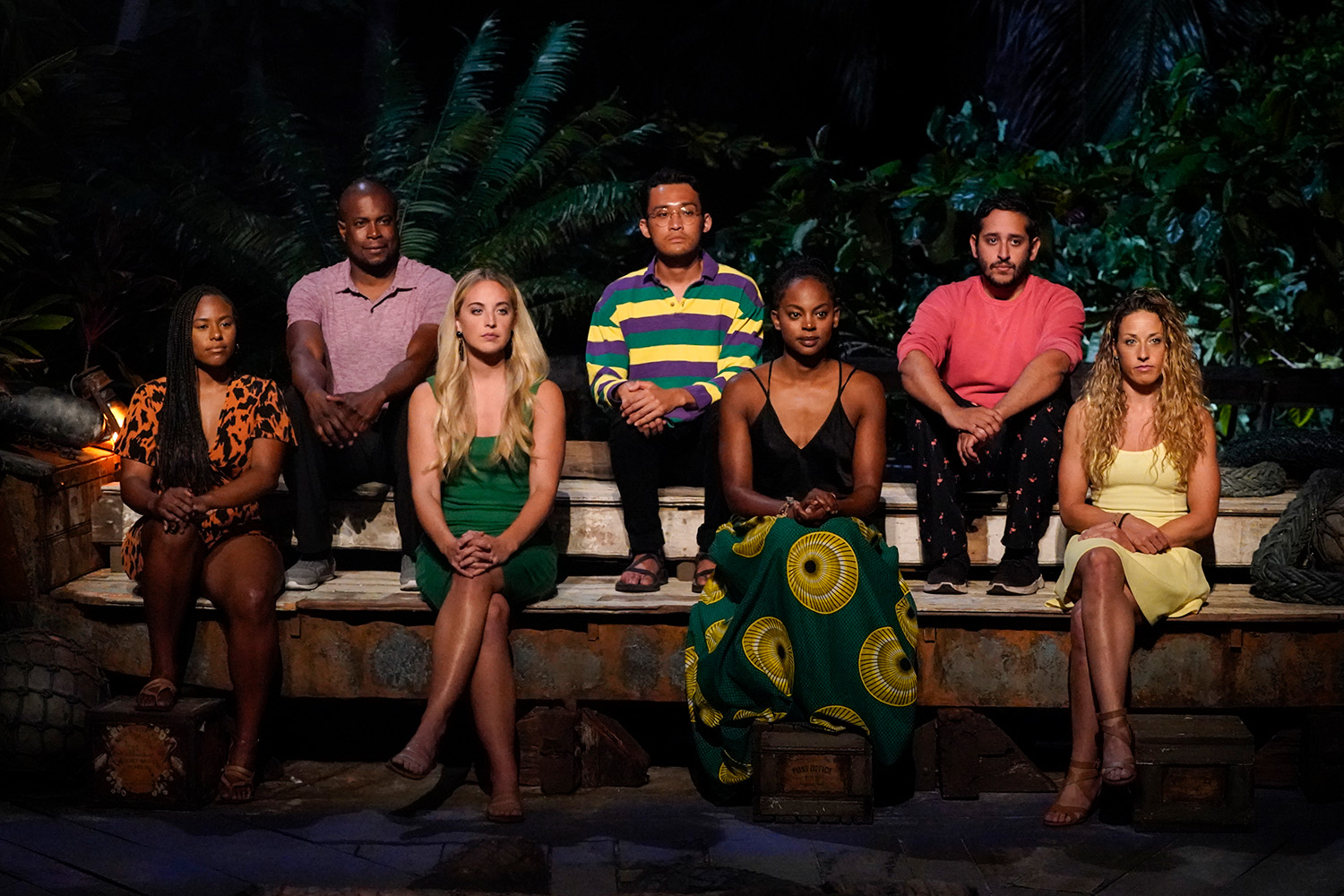
Challenge:
Represent as a Black woman in a reality TV world that isn't always an accurate reflection of the world we live in.
Advantage:
CBS institutes a diversity initiative that includes a target that 50% of reality show casts be people of color.
Blindside:
Her season of "Survivor" brings the issue of implicit bias to the forefront — after Howell is voted off.
➤ In the episode following Howell's elimination, as she sat on the "jury," an important dialogue about race began. She was unable to participate in the conversation because game rules dictate that members of the jury are unable to speak during the tribal council discussions. The next person voted off after Howell turned out to be Rocksroy Bailey, a Black man. Seeing Howell and Bailey seated on the jury shifted the game when Black contestants Maryanne Oketch and Drea Wheeler began a tribal council dialogue about implicit bias. It was an emotionally charged episode and, as contestant Lindsay Dolashewich stated, "a moment bigger than the game."
"It was hard to sit in the tribal council and not say anything," says Howell, "because it's a shared experience that we all have and a fear that I think I personally had and a lot of Black people, Black women have when they go into the game of 'Survivor,' which is: Is there going to be a pattern continued?"
Oketch and Wheeler spoke eloquently about what it meant to play the game as a Black woman knowing that, no matter who you are as an individual, you are representing for all Black and Brown girls watching. In this moment, Oketch may well have cemented her eventual game win.
Though she wishes she could have taken part in the conversation, Howell is glad that her very presence as the first of two Black people voted off in a row set off what she considers a necessary dialogue. "It was a very important conversation to have "¦ I'm happy that America or the world got to see that conversation."

Howell trained madly for the strength, endurance, and wilderness challenges of the show (even making fire with flint in Central Park), only to discover it's all about your social game. The first member of the jury, she was soon joined by other voted-off castmates who would vote to determine the winner of the season's million-dollar prize.
It was Howell, in the finale, who cast the first vote for Oketch to win the $1 million, the first black woman to win the title in 20 years.
"The demographic that is watching the show is diversifying, which means we want to see people on the show that we relate to "¦ and not just from a race perspective. For example, I'm a Black woman, there are so many different types of Black women. We don't exist in monoliths, some of us are awkward, some of us are funny, some of us are serious, some of us are professionals, and so there are different archetypes within the sub-demographics, which I think 'Survivor' is doing a great job of capturing so well. I remember a world where I would be like, 'Oh, man, if they cast this person they may not cast me.' But no, we're in a world where they might cast both of us. And someone else."
On the extreme red-eye to New York (scheduled to leave at 11:30 p.m., took off at 2 a.m.), I had thought ahead to my transition from "Survivor" fan to "Survivor" writer (is that a job? Probst, call me). I worried I would no longer be as enthralled with the show after our interview. But I am. Because it's casting people like Howell, having dialogues about implicit bias, pushing people's bodies and minds to their limits, that makes the show in many ways mirror the everyday struggles of humanity. It's been a rough few years for us humans — and watching people live in a place with no cellphones, or jobs, or money, or computers, or social media, is a welcome all-consuming escape.
"You get so entranced in the game that nothing exists besides the game," says Howell. "And it wasn't until months later when I was like, whoa, I definitely lost a million dollars, that's crazy."
I have a feeling Howell will find another way to earn that million dollars. She's done so much already — probably due in part to an Excel spreadsheet she made of things that would make her happy and things that would make her money. "Survivor" was near the top of that list. So were day trading, food blogging, and DJing, all things she has tried. She still has more to check off the list — Howell is just getting started. At age 30, she's already been to 5 out of 7 continents. "I want to see them all," she says.
But first, she walks me to my subway stop so I can go back, take off my wet clothes, wring the sweat from my bra, eat a giant Tex-Mex bowl, and sit in the air conditioning. Not Howell. She turns around to go for a run in the park.
Back in my room, washing the sweat-filled eye makeup off my cheeks, I think of something Howell said about "Survivor" that sums up how I feel about our day together:
"Even the seconds that I hated, I still loved it as a whole."
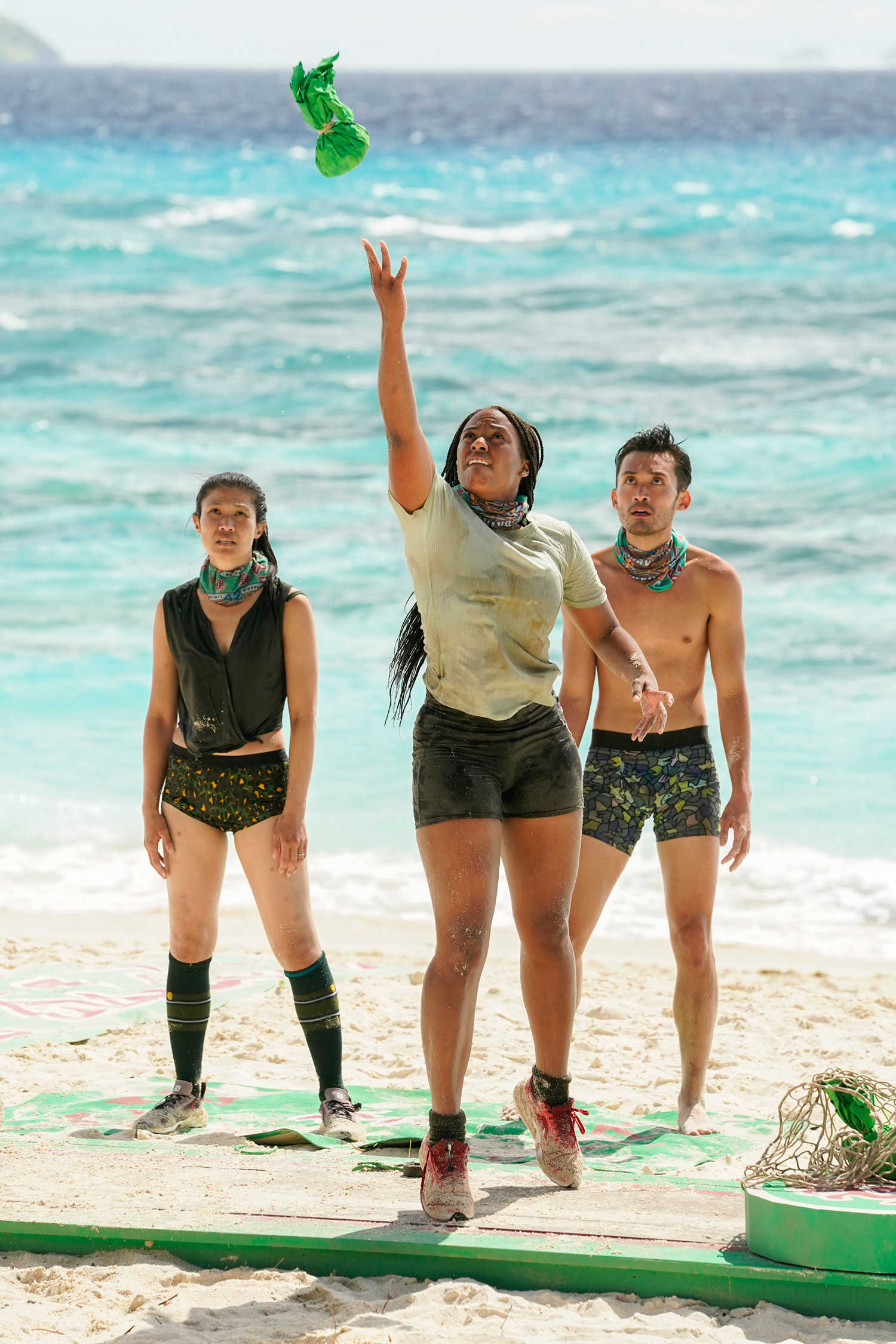
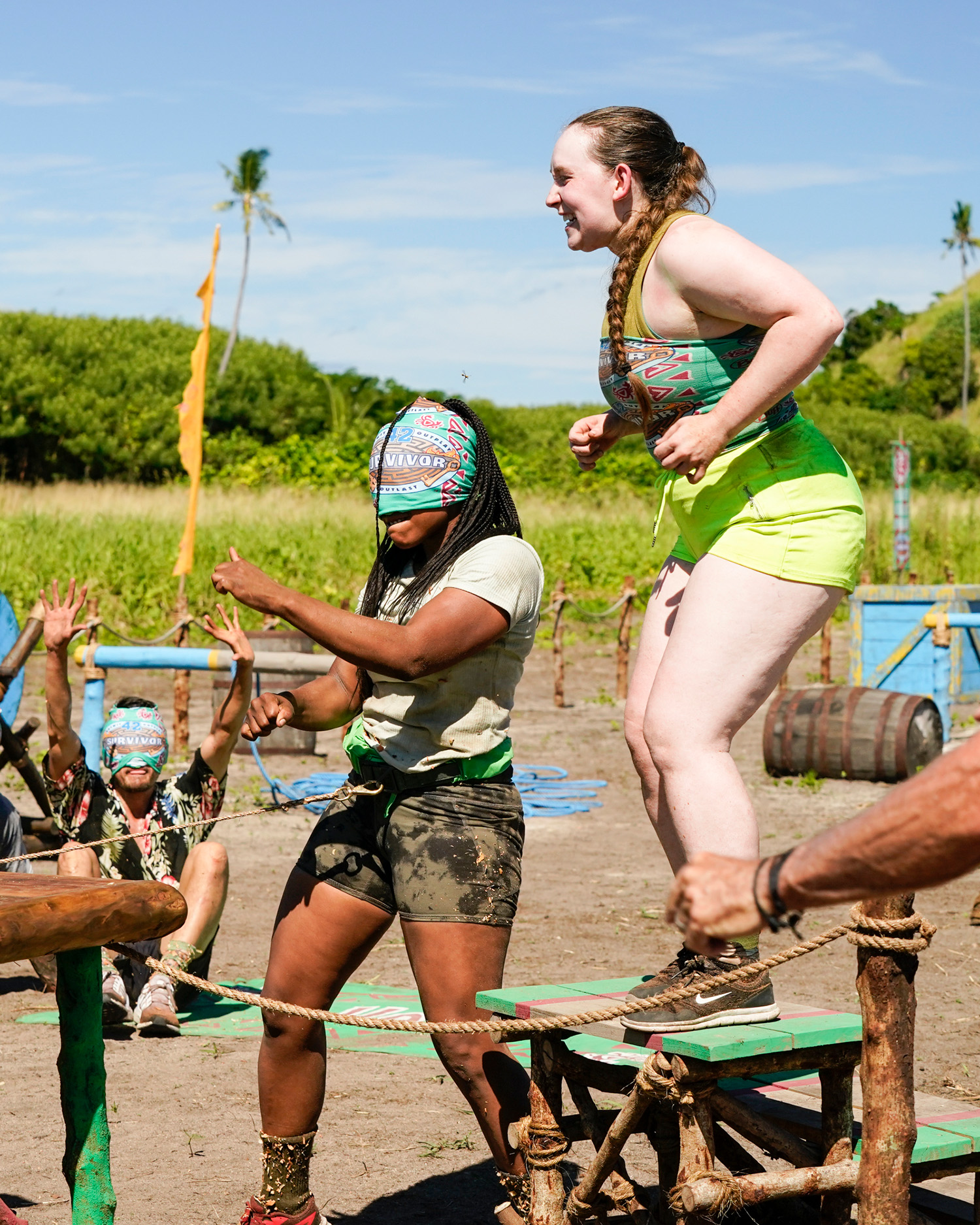
""¦ nothing exists besides the game."

Leave a Reply